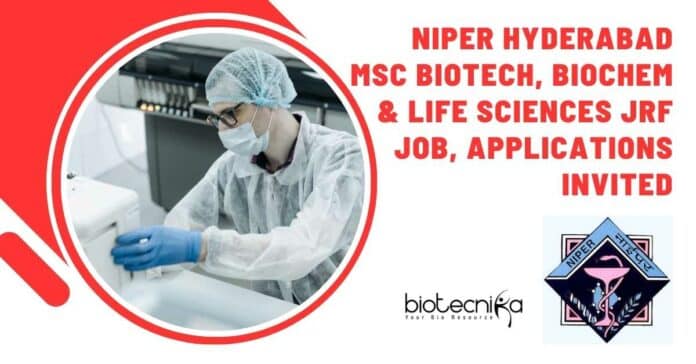NIPER Hyderabad MSc Biotech, Biochem & Life Sciences JRF Job, Applications Invited
NIPER Hyderabad MSc Biotech, Biochem & Life Sciences JRF Job, Applications Invited. NIPER Jobs. JRF job opening for MSc Life Sciences, Biochemistry, Biotechnology. Interested and eligible applicants can check out all of the details on the same below
Aspiring candidates for the JRF role at NIPER can check out the possible interview questions at the bottom of the page
This job expires in
Advertisement Details:
Applications are invited from suitable candidates for filling up the position of junior research fellow-JRF, (ICMR, Project) at Department of Biological Science, National Institute of Pharmaceutical Education and Research, Hyderabad, against the project entitled “Identification of molecular reprogramming landscape of pre and post neoadjuvant chemotherapy in Gastric Cancer and it’s therapeutic implications” under the PI Dr. Santosh Kumar Guru. The eligibility criteria for the position are mentioned below.
Position: Junior Research Fellow
No. of Posts: 01
Project Title: “Identification of molecular reprogramming landscape of pre and post neoadjuvant chemotherapy in Gastric Cancer and it’s therapeutic implications”
Name of the PI: Dr. Santosh Kumar Guru
AGE LIMIT: Maximum 28 years old
How to Apply
Last date of application: 20th June 2023
Contact: Kindly send your 2 Page CV with your qualification, expertise, and any publications to [email protected] (Kindly mentioned in the subject Application for JRF)
Qualification
Essential Qualification: M.Sc. (Life Sciences: Biochemistry, Biotechnology, or any branch of Life Sciences) degree holders.
Desired qualification: A candidate with relevant experience in Molecular biology, cell culture, techniques and expertise in transgenic animal experience will be preferred. CSIR-UGC NET-LS Candidates are also eligible
Salary: Rs: 31,000/- Per Month with HRA 27% (As Per ICMR Rules)
Check the notification below
Are you on the lookout for some sample interview questions that can be asked during the interview for the JRF role at NIPER, then read below.
- Can you explain your experience and expertise in molecular biology and cell culture techniques? How have you applied these skills in previous research projects? Answer: I have a strong background in molecular biology and cell culture techniques. I have utilized these skills in various research projects, including analyzing gene expression patterns, conducting PCR and qPCR experiments, and performing cell-based assays. Additionally, I have experience in maintaining cell lines, optimizing culture conditions, and transfecting cells for gene expression studies.
- Have you worked with transgenic animal models before? Can you describe your experience and any specific techniques you have used? Answer: Yes, I have experience working with transgenic animal models. In a previous project, I was involved in generating transgenic mice to study the role of a specific gene in disease development. I utilized techniques such as pronuclear injection and genotyping to create and confirm the presence of transgenes. I also performed phenotypic characterization and conducted molecular analyses on tissues obtained from the transgenic animals.
- How familiar are you with molecular reprogramming in the context of cancer research? Can you explain the concept and its potential therapeutic implications? Answer: Molecular reprogramming refers to the changes in gene expression patterns that occur during disease progression or in response to treatments. In the context of cancer research, understanding the molecular reprogramming landscape can provide valuable insights into disease mechanisms and identify potential therapeutic targets. By studying the alterations in gene expression before and after neoadjuvant chemotherapy in gastric cancer, we can gain a deeper understanding of the treatment response and potentially discover novel therapeutic strategies.
- Have you utilized techniques such as next-generation sequencing or gene expression profiling in your previous research? Can you discuss any specific experiments or analyses you have performed? Answer: Yes, I have experience with next-generation sequencing (NGS) and gene expression profiling techniques. In one of my research projects, we performed RNA-Seq analysis to profile the transcriptome of cancer cells under different treatment conditions. We used bioinformatics tools to analyze the sequencing data, identify differentially expressed genes, and perform pathway enrichment analyses. This allowed us to gain insights into the molecular changes associated with treatment response.
- How do you stay updated with the latest advancements and techniques in the field of life sciences and cancer research? Can you provide examples of any recent publications or conferences you have followed? Answer: I am committed to staying updated with the latest advancements in the field of life sciences and cancer research. I regularly read scientific journals, attend conferences, and participate in webinars and workshops. Recently, I came across a publication discussing the role of epigenetic modifications in gastric cancer progression, which highlighted potential therapeutic targets. I also attended a conference where experts presented their findings on molecular profiling techniques for cancer diagnosis and treatment stratification.
Note: These sample interview questions and answers are based on the information provided in the job description. It’s recommended to tailor the questions to align with the specific requirements and responsibilities of the role.
Editor’s Note: NIPER Hyderabad MSc Biotech, Biochem & Life Sciences JRF Job, Applications Invited. Please ensure that you are subscribed to the Biotecnika Times Newsletter and our YouTube channel to be notified of the latest industry news. Follow us on social media like Twitter, Telegram, Facebook


























